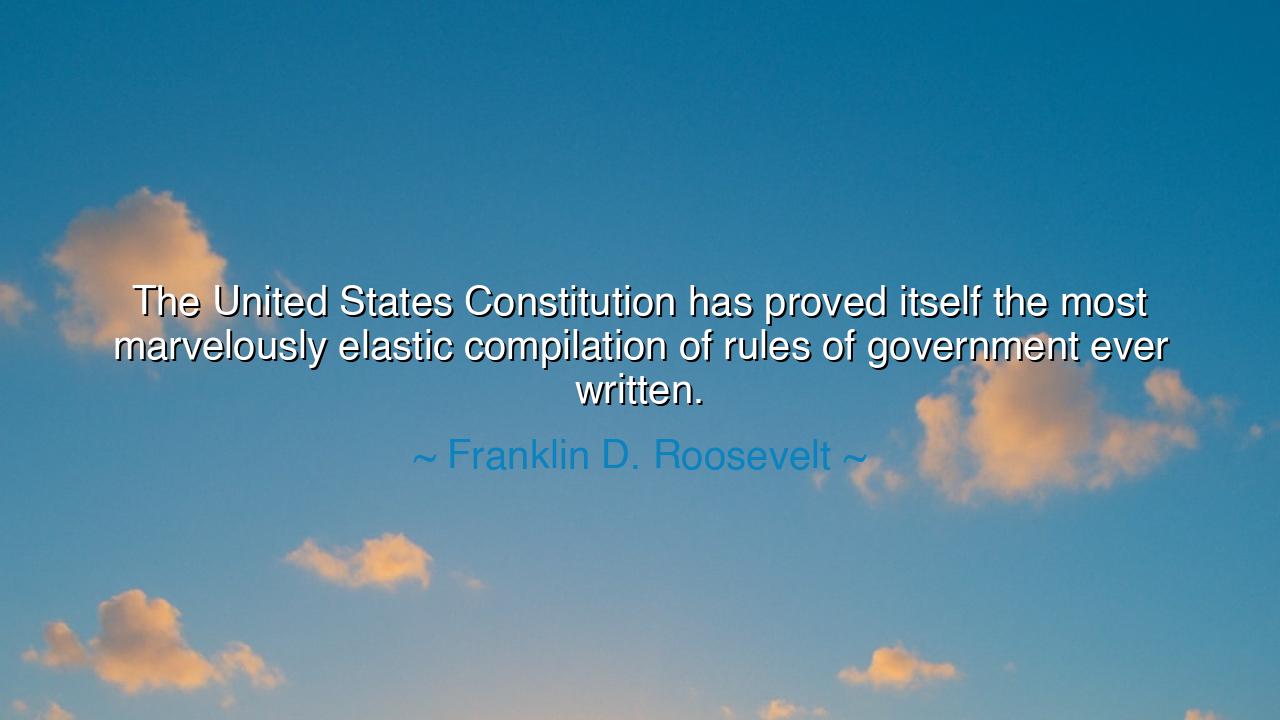
The United States Constitution has proved itself the most
The United States Constitution has proved itself the most marvelously elastic compilation of rules of government ever written.






"The United States Constitution has proved itself the most marvelously elastic compilation of rules of government ever written." – Franklin D. Roosevelt
In these noble words, Franklin D. Roosevelt, the only American president to lead through both the Great Depression and a world at war, pays homage to the Constitution—that living document which has guided the United States through triumph and trial alike. His praise of its “elasticity” is not a reference to weakness or compromise, but to strength born of adaptability. He recognized that in a world of changing circumstances and unforeseen challenges, the Constitution’s true genius lies in its ability to endure not by rigidity, but by resilience. It bends without breaking, and in bending, it preserves the principles that define liberty itself.
The origin of this quote is rooted in Roosevelt’s deep reflection on the crises of his time. When he took office in 1933, America was on the edge of ruin. Banks had collapsed, families were hungry, and faith in government had eroded. To rescue the nation, Roosevelt wielded powers no peacetime president had ever used—creating agencies, issuing orders, and reshaping the economic landscape. Critics accused him of violating the Constitution, of overreaching his authority. Yet Roosevelt saw it differently. He believed the Constitution was not a cage but a charter of empowerment, meant to serve the people’s needs in every generation. Its elasticity, he argued, was its greatest virtue—the very quality that allowed it to guide a frontier nation into an industrial one, and an industrial one into a global power.
To call the Constitution “marvelously elastic” is to recognize that it was designed with wisdom that transcends time. The Founding Fathers, in their genius, did not bind future generations to the conditions of 1787. Instead, they created a framework flexible enough to accommodate evolution—through amendment, interpretation, and imagination. It is a structure that balances stability with change, authority with liberty. Madison, Hamilton, and Washington understood that human progress would demand adaptation. They built a document that could breathe. Roosevelt’s words, then, are both a tribute to them and a reaffirmation of their vision: that the essence of democracy is not stagnation, but growth guided by principle.
History itself offers proof of this elasticity. Consider the Emancipation Proclamation of Abraham Lincoln—a wartime measure that redefined the very meaning of liberty under the Constitution. Or the Civil Rights Movement, which called upon the promise of the Fourteenth Amendment to extend equality to those long denied it. Each time, America faced moral upheaval, and each time, the Constitution stretched to meet the demands of justice. What lesser systems of government might have shattered under pressure, the American Constitution absorbed, reinterpreted, and refined. Its endurance is not that of a stone wall, but of a living tree—rooted in eternal truth, yet reaching ever toward the light of new understanding.
Roosevelt himself tested that elasticity in profound ways. Through the New Deal, he expanded the federal government’s role to confront economic despair, establishing social security, labor rights, and public works that would uplift millions. Some called it unconstitutional; others called it salvation. In the end, history judged it as transformation within the framework of law—a demonstration that the Constitution could empower a government to act boldly without betraying its soul. It was this harmony of strength and flexibility that inspired Roosevelt’s reverence. For him, the Constitution was not sacred parchment preserved behind glass—it was the beating heart of a living nation.
His words also carry a warning. Elasticity is a blessing only when guided by virtue. The power to adapt must never become the power to distort. A government that stretches the Constitution to justify oppression, corruption, or unchecked authority betrays its own foundation. True elasticity is moral as well as legal—it exists to protect liberty, not to erode it. Roosevelt understood this balance deeply: the Constitution must evolve, but always within the orbit of justice and the people’s consent.
The lesson, then, is timeless: greatness lies in the ability to change without losing one’s identity. The Constitution teaches us that permanence does not mean paralysis. So too in our own lives—we must hold fast to principle while adapting to circumstance. The strength of character, like that of a nation, is proven not in unbending stubbornness, but in faithful flexibility—the capacity to grow, to listen, and to meet the moment without betraying one’s core.
And so, the practical actions are clear: cherish your freedoms, but understand the duties that sustain them. Defend the Constitution not as a relic, but as a living covenant—open to renewal, yet anchored in righteousness. When times of crisis come, let courage guide reform, and let wisdom temper power. For as Franklin D. Roosevelt reminded us, the Constitution’s marvel lies not in its perfection, but in its living spirit—that eternal balance between law and liberty, constancy and change, which keeps the flame of democracy burning bright across the ages.






AAdministratorAdministrator
Welcome, honored guests. Please leave a comment, we will respond soon